(October 25, 2019, Changsha) Sunshine Guojian announced recently that Xenopax, the only humanized anti-CD25 monoclonal antibody injection approved for marketing in China, has been officially launched. The monoclonal antibody drug is independently developed by Sunshine Guojian and used for prevention of acute rejection after renal transplantation. It can be combined with the routine immunosuppression regime to significantly improve the survival rate of transplanted organs and the quality of life of patients.
At the launch ceremony of Xenopax, experts agreed that the marketing of Xenopax marks that immunotherapy drugs independently developed in China reached first-class levels globally, which will bring more drug options to Chinese patients who have received organ transplantation and open a new chapter in the field of immunosuppression in China.
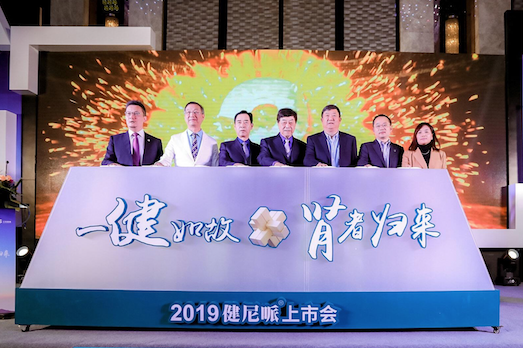
Launch Ceremony of Xenopax
Survival of patients with renal transplantation seriously affected by immunological rejection, making domestic humanized immunosuppressors urgently needed.
Renal transplantation, as the optimal renal therapy alternative for patients with end-stage chronic renal failure, is being rapidly rolled out in the world. However, the long-term survival rate of the graft after renal transplantation remains at a low level.
The statistics of Chinese Scientific Registry of Kidney Transplantation Data Center (CSRKT) showed that 7,131 cases of renal transplantation were completed in China in 2015, ranking second only to the United States. The latest OPTN/SRTR annual report published in Am J Transplant in February 2019 showed that the 5-year and 10-year all-cause graft failure rates were 22.7% and 49.8% respectively after the deceased donor renal transplantation, indicating that the 10-year graft survival rate was only 50.2%. The low long-term survival rate of the graft was attributed to two major causes, 50% of which were cardiovascular and cerebrovascular diseases (36.1%), infection (17.6%) and tumor (9.2%). The other 50% were nonspecific interstitial fibrosis, tubular atrophy, chronic rejection and acute rejection.
Studies have revealed that most acute rejection, which is the most common type of rejection, occurred within the first 3 months after transplantation. Acute rejection within one year after organ transplantation is a key predictive factor for long-term survival of renal grafts. The half-life of grafts of patients without AR within one year after transplantation was twice as long as that of patients with AR (17.9 years and 8.8 years, respectively), and with a reasonable immunosuppressor regime, the long-term survival of renal transplant recipients can be greatly improved and the toxic and adverse effects from long-term use of immunosuppressors can be reduced. Clinical applications showed that the acute rejection can be decreased by antibody induction therapy, leading to a reduction of 30%-40% of the incidence rate of early postoperative acute rejection. Xenopax’s highly humanized design aims to minimize the adverse drug reactions and it can improve the long-term survival of renal transplant recipients. It is urgently needed by patients after renal transplantation.
According to Professor Chen Zhonghua, member of National Organ Donation and Transplantation Committee, member of Special Working Committee for Development of National Organ Transplantation and Organ Transplantation Research Institute of Tongji Hospital Affiliated to Huazhong University of Science and Technology, organ transplantation is honored as one of the greatest medical achievements in the 21st century and a special way to save and prolong life. With the further modification and improvement of the Regulations on Human Organ Transplantation, the year 2020 will surely become a turning point in the history of organ transplantation in China. The localization of humanized immunosuppressors helps bridge many gaps in the field of domestic biomedicine. It can not only provide patients with better treatment options, but also meet the needs of the development of organ transplantation in China. This kind of drug enhances the accessibility of immunological preparations after organ transplantation and improves the long-term survival, while providing a powerful safeguard for the source of organs that are precious to the large number of transplant recipients.
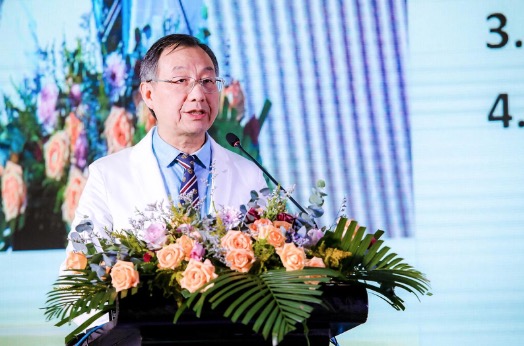
Professor Chen Zhonghua at Organ Transplantation Research Institute of Tongji Hospital Affiliated to Huazhong University of Science and Technology
Xenopax - the only humanized anti-CD25 monoclonal antibody drug approved for marketing in China.
According to Professor Zhu Tongyu, member of Organ Transplantation Branch of Chinese Medical Association, Chairman of Organ Transplantation Branch of Shanghai Medical Association and Vice President of Zhongshan Hospital Affiliated to Fudan University, the renal transplantation has become a regular operation benefiting from the use of immunosuppressive drugs, coupled with the improvement of surgical technique. The immunosuppressor has entered a new era since 2000, allowing patients to enjoy more precise immunosuppressive effects and more benefits. In recent years, “Created in China” solutions have been playing an increasingly important role in the field of immune drugs, bringing out great contribution to the improvement of China’s medical capability.
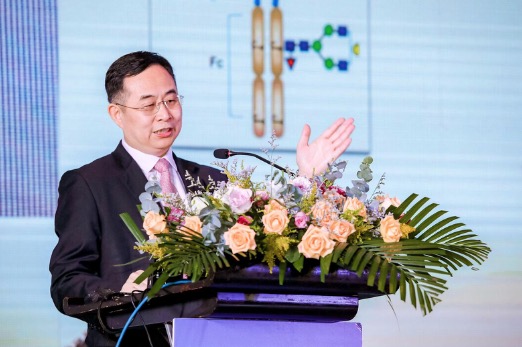
Professor Zhu Tongyu, Vice President of Zhongshan Hospital Affiliated to Fudan University
Xenopax can specifically act on the activated T cell IL-2 receptor α chain and antagonizes the proliferation of T cells mediated by the binding of IL-2 to its receptor through competitive binding with IL-2 receptor, and it can also down-regulate the expression of IL-2 receptor on the surface of activated T cells and inhibit the proliferation of T cells induced by IL-2, inhibiting the antibody-dependent cell-mediated cytotoxicity (ADCC) and selectively destroying the activated lymphocytes to make them inactivated, thereby playing the immunosuppressive role.
Humanized and long-acting - lower immunogenicity and longer coverage period.
Xenopax contains 90% human IgG sequence and 10% mouse IgG sequence, and is more humanized than the chimeric anti-CD25 monoclonal antibody, thus decreasing the incidence rate of drug-related adverse reactions. Research results showed that the incidence rate of adverse reactions of the humanized antibody is about 1-8%, while that of the chimeric antibody is as high as 1-57%.
With the same two doses, the effective acting time of Xenopax is longer than that of the chimeric anti-CD25 monoclonal antibody. Studies have shown that the action of two doses of Xenopax can last 70 days, while the action of two doses of the chimeric anti-CD25 monoclonal antibody can only last 28-42 days. On the premise of cutting costs, the two-dose induction therapy of Xenopax (the first dose is usually given preoperatively or intraoperatively, and the second dose is given 14 days later) can achieve similar efficacy, which is totally consistent with the needs of domestic patients.
Excellent efficacy - lowering the incidence rate of acute rejection effectively.
The results of phase III clinical trial of Xenopax have confirmed that the incidence rate of acute rejection decreased by 43.7% three months after transplantation and 40.2% six months after transplantation when Xenopax was added onto the basic immunosuppressive regime (CNI + MPA + glucocorticoid), and the one-year survival rate of human kidney of patients was 100% and 99.46% respectively. Compared with the basic immunosuppressive regime, the incidence rate of acute rejection of patients was substantially lower (7.7% vs 15.6%, 19.2% vs 28.9%, 23.1% vs 35.6%, 30.8% vs 46.7%) in 1, 3, 6 and 12 months after renal transplantation.
Safe and reliable - no increase in risk of infection.
Xenopax only works for the activated T-lymphocytes and hasn’t any effect on static T-lymphocytes and B-lymphocytes. In this way, the acute rejection can be effectively reduced without destroying the inhibiting effect of the body’s immune system on virus, bacteria and other microorganisms. Phase III clinical trial showed that the incidence rate of infection, tumor and other adverse reactions didn’t increased after Xenopax was added onto the basic immunosuppressive regime. This indicates that the acute rejection can be reduced through combination of anti-CD25 monoclonal antibody and routine immunosuppression regime, without affecting tolerance, rather than delaying its occurrence.
Innovative R&D: Sunshine Guojian finds new ground in the field of immunosuppression.
As one of the first batch of innovative biopharmaceutical company focusing on antibody drugs in China, Sunshine Guojian has always been focusing on the international priority disease fields of antibody drugs. In view of the fact that the penetration rate of bio-pharmaceuticals in China is lower than that in developed countries, the accessibility is low, patients have insufficient affordability for more urgently needed drugs, and many clinical needs cannot be met, the company has taken the initiative to develop multiple technical platforms for innovative antibody drugs.
According to Professor Shi Bingyi, chairman of Organ Transplantation Branch of Chinese Medical Association, member of National Organ Donation and Transplantation Committee and chief physician of the Whole-army Organ Transplantation Institute of the 8th Medical Center of Chinese PLA General Hospital, what matters most for organ transplantation now is not to solve the technical problems, but to guarantee the organ function and long-term survival. The continuous innovation and development of domestic drugs has boosted the accessibility of immune preparations and promoted their standardized use. This will provide significant assistance in improving the long-term survival rate of transplanted organs in China, ensure healthiness of the organs, reduce the number of organ donors and alleviate the tense situation of organ donation, eventually saving more lives.
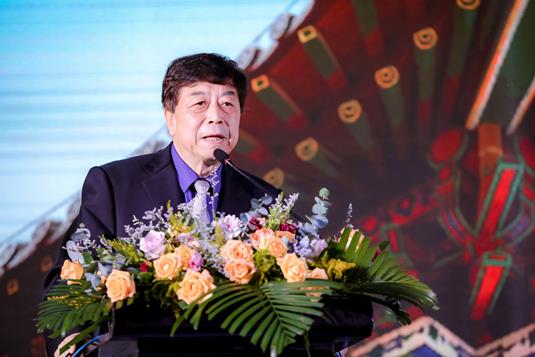
Professor Shi Bingyi, chairman of Organ Transplantation Branch of Chinese Medical Association
Professor Xue Wujun, chairman-designate of Organ Transplantation Branch of Chinese Medical Association, member of National Organ Donation and Transplantation Committee and director of Organ Transplantation Institute of Xi’an Jiaotong University, said: “The marketing of Xenopax marks that the innovation and efforts made by Sunshine Guojian have been recognized by the public, and also marks that the research and development of targeted biomedicines in China has been promoted to a new level. More “Created in China” R&D drugs are expected in the future to bring hope to an increasing number of patients, keep the patients away from the pain and help them recover as soon as possible.”
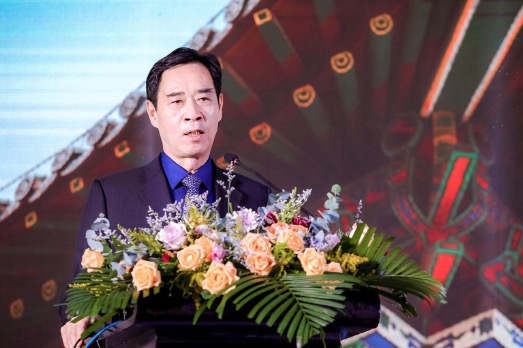
Professor Xue Wujun, chairman-designate of Organ Transplantation Branch of Chinese Medical Association
About Xenopax
Xenopax loads the DNA fragments of light and heavy chain genes containing anti-CD25 humanized monoclonal antibody into the eukaryotic expression vector by DNA recombination technology, and transfects the Chinese hamster ovary (CHO) cells, allowing efficient expression of anti-CD25 rhMAb protein. Xenopax is suitable for prevention of acute rejection after renal transplantation and can be combined with the routine immunosuppression regime to significantly improve the survival rate of transplanted organs and the quality of life of patients. Xenopax is the only humanized anti-CD25 monoclonal antibody injection approved for marketing in China.
About Sunshine Guojian
Founded in 2002, Sunshine Guojian is one of the first batch of Chinese innovative biopharmaceutical enterprises specializing in antibody drugs and it is also a domestic pharmaceutical enterprise with two listed therapeutic antibody drugs in China. It has become a leader in the field of antibody drugs in China with independent capabilities in research and development, manufacturing and commercialization. The company prioritizes R&D in innovative therapeutic antibody drugs, and provides high-quality, safe and effective clinical solutions for the treatment of autoimmune diseases, tumors and other major diseases. At present, the company has 15 antibody drugs (including 7 drugs in clinical phase and post-market clinical follow-up, 8 drugs in pre-clinical phase) in different development phases, covering tumor, autoimmunity and ophthalmology and other disease areas, most of which are Class 1 biological products or monoclonal antibodies for therapeutic use. The NDAs of two drugs have been submitted to regulators, and five products are in clinical trials. For some pipeline drugs, regulatory applications have been submitted in both China and the United States, and some have been granted the priority review designation.
For more information, please visit www.ynzqzl.com.
References:
1. Organ Transplantation Branch of Chinese Medical Association. Organ Transplantation. 2016; 7 (5):1-5.
2. Hart A, et al. Am J Transplant. 2019 Feb;19 Suppl 2:19-123.